Psychology for HSC: Psychological Theories and Mental Health in Care
VerifiedAdded on 2019/12/03
|12
|3966
|265
Report
AI Summary
This report provides a comprehensive overview of psychology, focusing on life span development theories, including continuity and discontinuity theories. It explores various psychological theories such as behavioral, cognitive, psychodynamic, and humanistic, and their application in health and social care. The report also examines the social and biological factors that influence human behavior, emphasizing the importance of social roles in care settings. Furthermore, it discusses how psychological theories inform the understanding of mental disorders and evaluates the application of psychological principles in behavior change within health and social care. The report concludes by highlighting the role of psychological theories in enhancing the understanding of relationships in health and social care, offering valuable insights for professionals and students alike. The report includes relevant examples such as the case of Sam who is suffering from Alzheimer's disease to illustrate concepts.
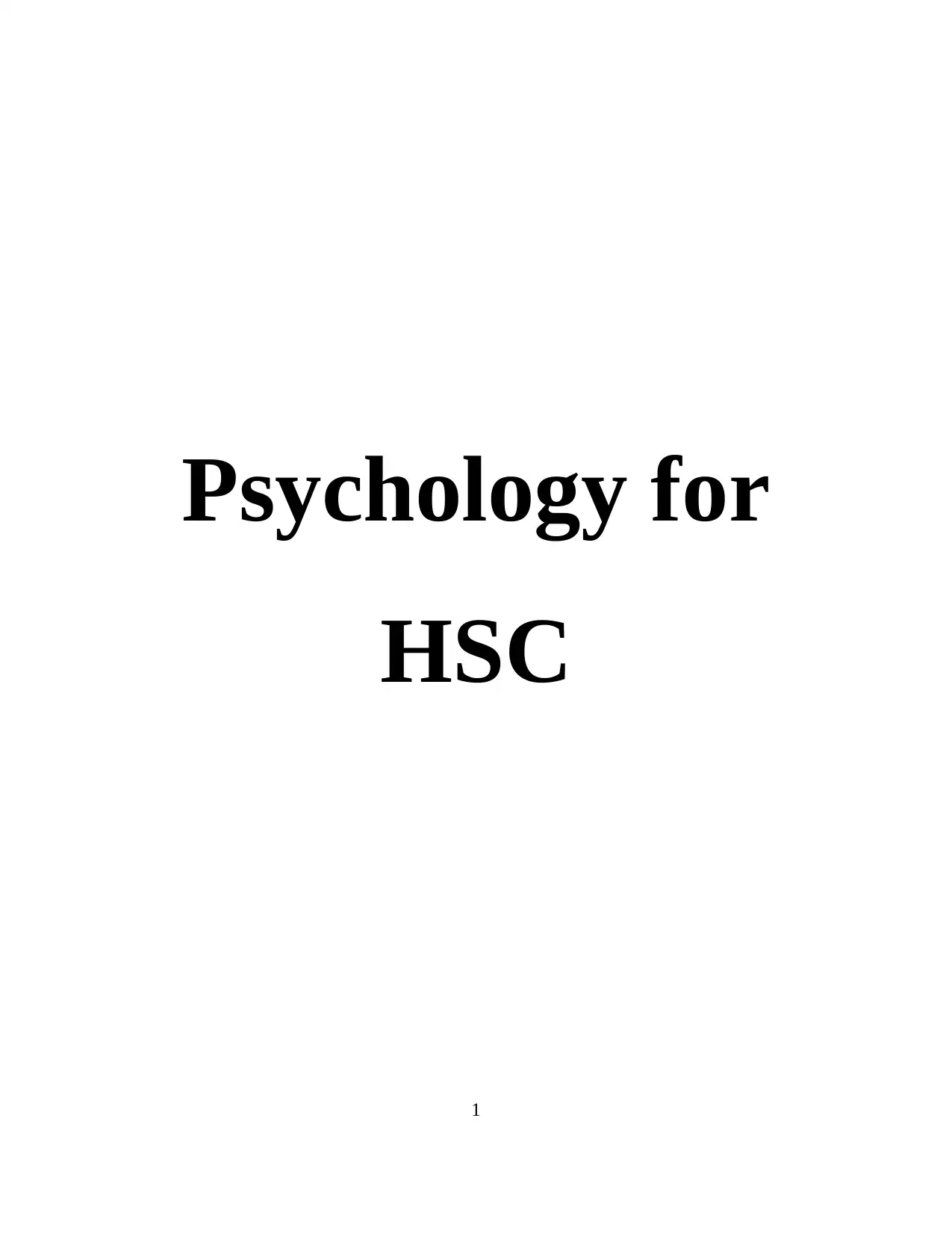
Psychology for
HSC
1
HSC
1
Paraphrase This Document
Need a fresh take? Get an instant paraphrase of this document with our AI Paraphraser
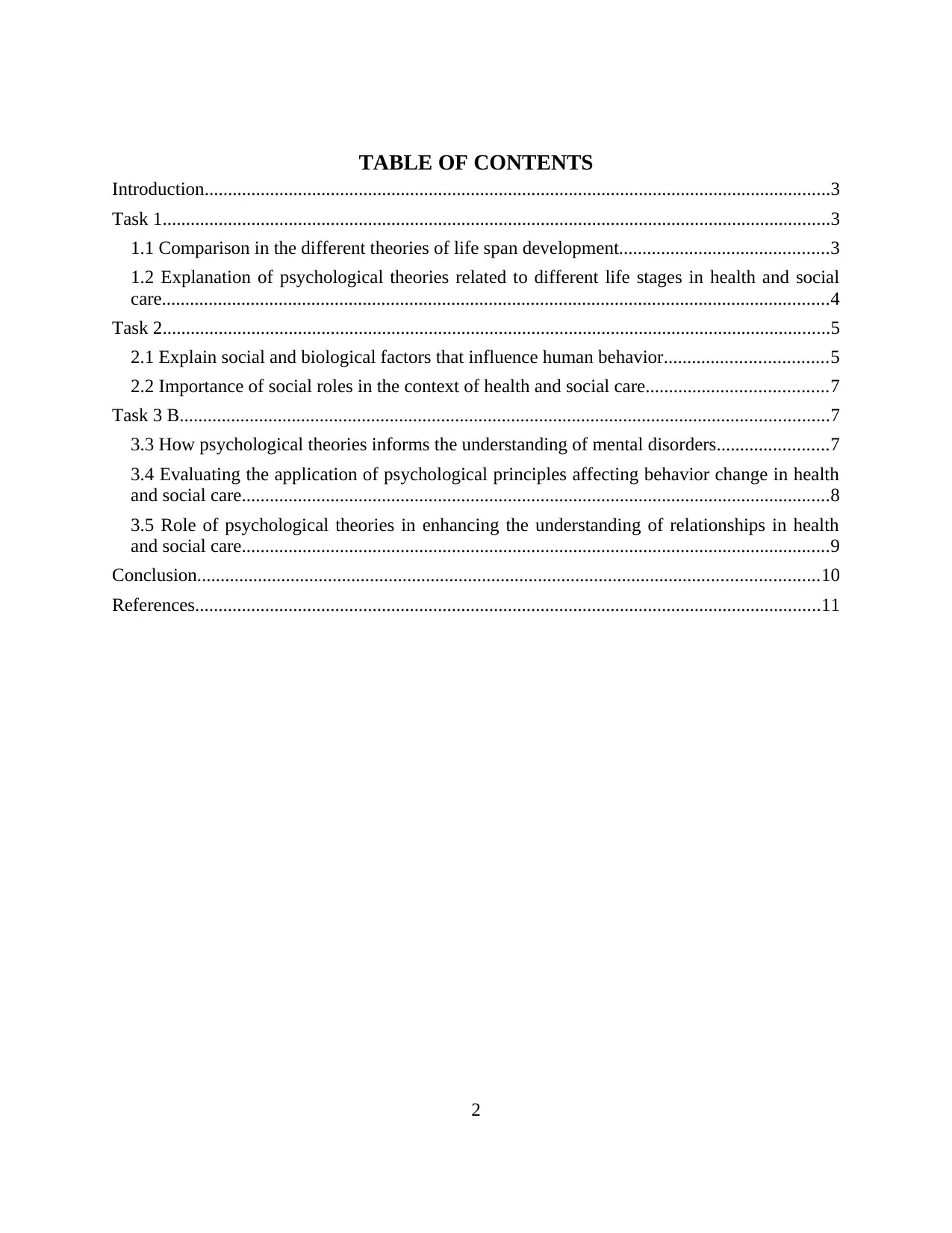
TABLE OF CONTENTS
Introduction......................................................................................................................................3
Task 1...............................................................................................................................................3
1.1 Comparison in the different theories of life span development.............................................3
1.2 Explanation of psychological theories related to different life stages in health and social
care...............................................................................................................................................4
Task 2...............................................................................................................................................5
2.1 Explain social and biological factors that influence human behavior...................................5
2.2 Importance of social roles in the context of health and social care.......................................7
Task 3 B...........................................................................................................................................7
3.3 How psychological theories informs the understanding of mental disorders........................7
3.4 Evaluating the application of psychological principles affecting behavior change in health
and social care..............................................................................................................................8
3.5 Role of psychological theories in enhancing the understanding of relationships in health
and social care..............................................................................................................................9
Conclusion.....................................................................................................................................10
References......................................................................................................................................11
2
Introduction......................................................................................................................................3
Task 1...............................................................................................................................................3
1.1 Comparison in the different theories of life span development.............................................3
1.2 Explanation of psychological theories related to different life stages in health and social
care...............................................................................................................................................4
Task 2...............................................................................................................................................5
2.1 Explain social and biological factors that influence human behavior...................................5
2.2 Importance of social roles in the context of health and social care.......................................7
Task 3 B...........................................................................................................................................7
3.3 How psychological theories informs the understanding of mental disorders........................7
3.4 Evaluating the application of psychological principles affecting behavior change in health
and social care..............................................................................................................................8
3.5 Role of psychological theories in enhancing the understanding of relationships in health
and social care..............................................................................................................................9
Conclusion.....................................................................................................................................10
References......................................................................................................................................11
2
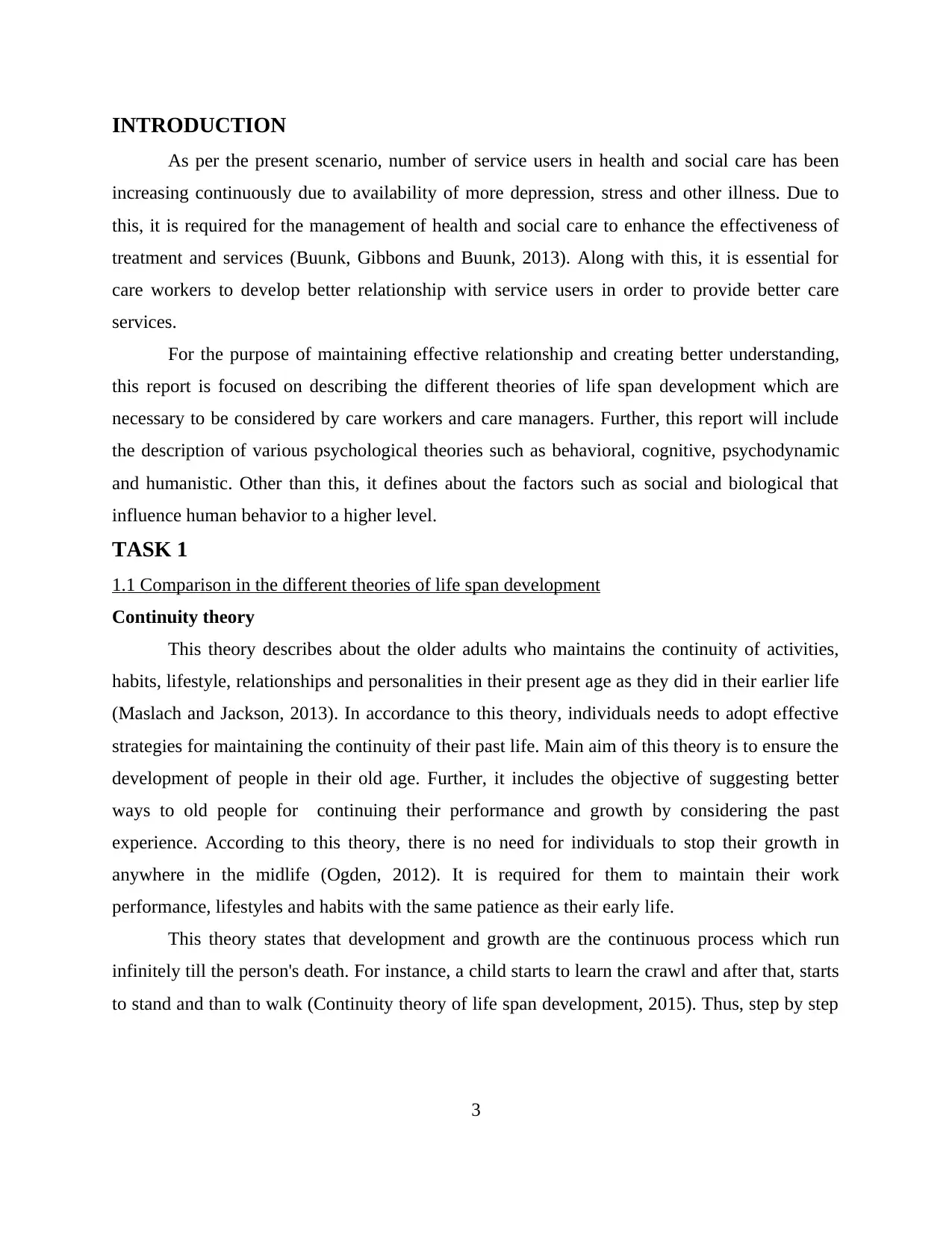
INTRODUCTION
As per the present scenario, number of service users in health and social care has been
increasing continuously due to availability of more depression, stress and other illness. Due to
this, it is required for the management of health and social care to enhance the effectiveness of
treatment and services (Buunk, Gibbons and Buunk, 2013). Along with this, it is essential for
care workers to develop better relationship with service users in order to provide better care
services.
For the purpose of maintaining effective relationship and creating better understanding,
this report is focused on describing the different theories of life span development which are
necessary to be considered by care workers and care managers. Further, this report will include
the description of various psychological theories such as behavioral, cognitive, psychodynamic
and humanistic. Other than this, it defines about the factors such as social and biological that
influence human behavior to a higher level.
TASK 1
1.1 Comparison in the different theories of life span development
Continuity theory
This theory describes about the older adults who maintains the continuity of activities,
habits, lifestyle, relationships and personalities in their present age as they did in their earlier life
(Maslach and Jackson, 2013). In accordance to this theory, individuals needs to adopt effective
strategies for maintaining the continuity of their past life. Main aim of this theory is to ensure the
development of people in their old age. Further, it includes the objective of suggesting better
ways to old people for continuing their performance and growth by considering the past
experience. According to this theory, there is no need for individuals to stop their growth in
anywhere in the midlife (Ogden, 2012). It is required for them to maintain their work
performance, lifestyles and habits with the same patience as their early life.
This theory states that development and growth are the continuous process which run
infinitely till the person's death. For instance, a child starts to learn the crawl and after that, starts
to stand and than to walk (Continuity theory of life span development, 2015). Thus, step by step
3
As per the present scenario, number of service users in health and social care has been
increasing continuously due to availability of more depression, stress and other illness. Due to
this, it is required for the management of health and social care to enhance the effectiveness of
treatment and services (Buunk, Gibbons and Buunk, 2013). Along with this, it is essential for
care workers to develop better relationship with service users in order to provide better care
services.
For the purpose of maintaining effective relationship and creating better understanding,
this report is focused on describing the different theories of life span development which are
necessary to be considered by care workers and care managers. Further, this report will include
the description of various psychological theories such as behavioral, cognitive, psychodynamic
and humanistic. Other than this, it defines about the factors such as social and biological that
influence human behavior to a higher level.
TASK 1
1.1 Comparison in the different theories of life span development
Continuity theory
This theory describes about the older adults who maintains the continuity of activities,
habits, lifestyle, relationships and personalities in their present age as they did in their earlier life
(Maslach and Jackson, 2013). In accordance to this theory, individuals needs to adopt effective
strategies for maintaining the continuity of their past life. Main aim of this theory is to ensure the
development of people in their old age. Further, it includes the objective of suggesting better
ways to old people for continuing their performance and growth by considering the past
experience. According to this theory, there is no need for individuals to stop their growth in
anywhere in the midlife (Ogden, 2012). It is required for them to maintain their work
performance, lifestyles and habits with the same patience as their early life.
This theory states that development and growth are the continuous process which run
infinitely till the person's death. For instance, a child starts to learn the crawl and after that, starts
to stand and than to walk (Continuity theory of life span development, 2015). Thus, step by step
3
⊘ This is a preview!⊘
Do you want full access?
Subscribe today to unlock all pages.

Trusted by 1+ million students worldwide
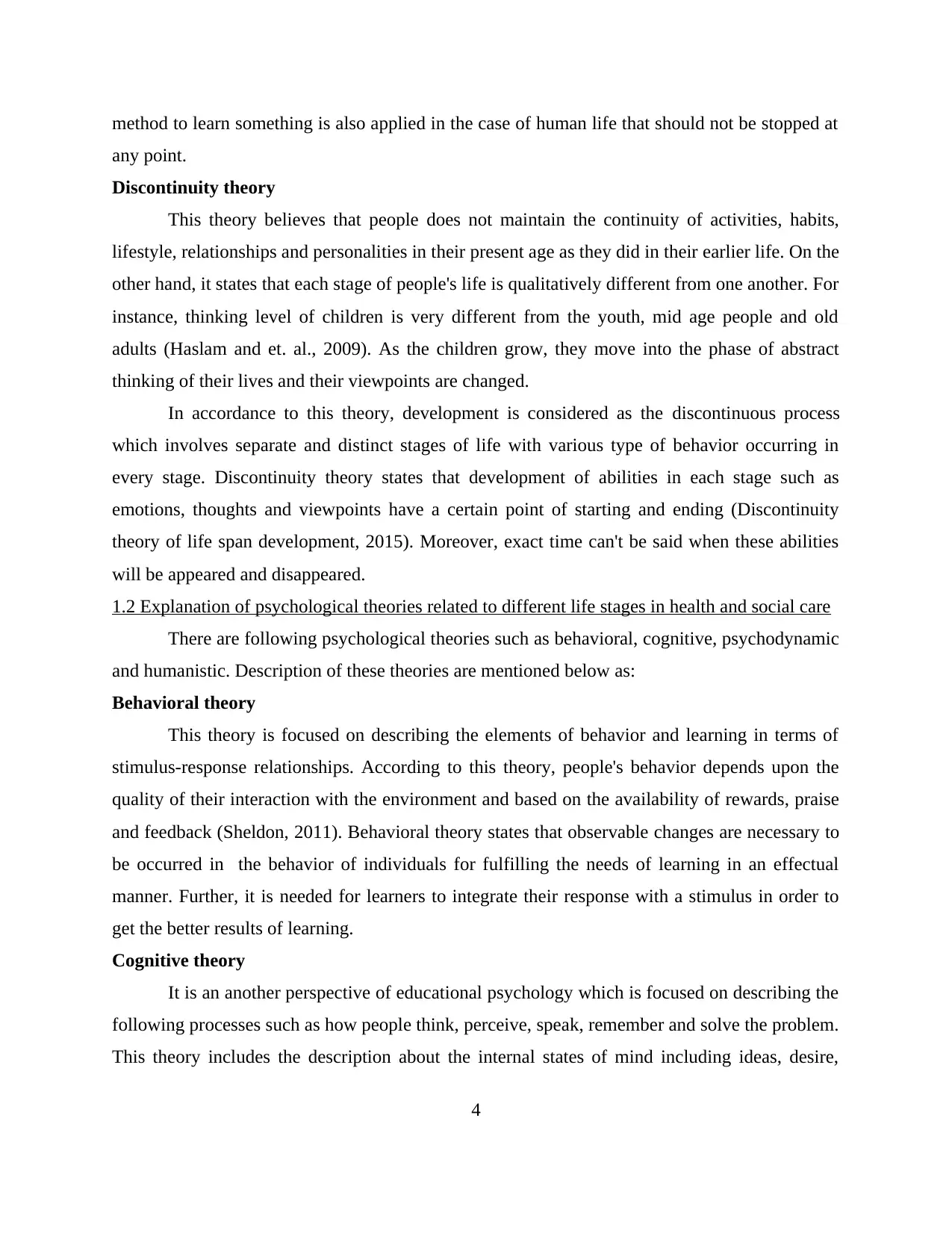
method to learn something is also applied in the case of human life that should not be stopped at
any point.
Discontinuity theory
This theory believes that people does not maintain the continuity of activities, habits,
lifestyle, relationships and personalities in their present age as they did in their earlier life. On the
other hand, it states that each stage of people's life is qualitatively different from one another. For
instance, thinking level of children is very different from the youth, mid age people and old
adults (Haslam and et. al., 2009). As the children grow, they move into the phase of abstract
thinking of their lives and their viewpoints are changed.
In accordance to this theory, development is considered as the discontinuous process
which involves separate and distinct stages of life with various type of behavior occurring in
every stage. Discontinuity theory states that development of abilities in each stage such as
emotions, thoughts and viewpoints have a certain point of starting and ending (Discontinuity
theory of life span development, 2015). Moreover, exact time can't be said when these abilities
will be appeared and disappeared.
1.2 Explanation of psychological theories related to different life stages in health and social care
There are following psychological theories such as behavioral, cognitive, psychodynamic
and humanistic. Description of these theories are mentioned below as:
Behavioral theory
This theory is focused on describing the elements of behavior and learning in terms of
stimulus-response relationships. According to this theory, people's behavior depends upon the
quality of their interaction with the environment and based on the availability of rewards, praise
and feedback (Sheldon, 2011). Behavioral theory states that observable changes are necessary to
be occurred in the behavior of individuals for fulfilling the needs of learning in an effectual
manner. Further, it is needed for learners to integrate their response with a stimulus in order to
get the better results of learning.
Cognitive theory
It is an another perspective of educational psychology which is focused on describing the
following processes such as how people think, perceive, speak, remember and solve the problem.
This theory includes the description about the internal states of mind including ideas, desire,
4
any point.
Discontinuity theory
This theory believes that people does not maintain the continuity of activities, habits,
lifestyle, relationships and personalities in their present age as they did in their earlier life. On the
other hand, it states that each stage of people's life is qualitatively different from one another. For
instance, thinking level of children is very different from the youth, mid age people and old
adults (Haslam and et. al., 2009). As the children grow, they move into the phase of abstract
thinking of their lives and their viewpoints are changed.
In accordance to this theory, development is considered as the discontinuous process
which involves separate and distinct stages of life with various type of behavior occurring in
every stage. Discontinuity theory states that development of abilities in each stage such as
emotions, thoughts and viewpoints have a certain point of starting and ending (Discontinuity
theory of life span development, 2015). Moreover, exact time can't be said when these abilities
will be appeared and disappeared.
1.2 Explanation of psychological theories related to different life stages in health and social care
There are following psychological theories such as behavioral, cognitive, psychodynamic
and humanistic. Description of these theories are mentioned below as:
Behavioral theory
This theory is focused on describing the elements of behavior and learning in terms of
stimulus-response relationships. According to this theory, people's behavior depends upon the
quality of their interaction with the environment and based on the availability of rewards, praise
and feedback (Sheldon, 2011). Behavioral theory states that observable changes are necessary to
be occurred in the behavior of individuals for fulfilling the needs of learning in an effectual
manner. Further, it is needed for learners to integrate their response with a stimulus in order to
get the better results of learning.
Cognitive theory
It is an another perspective of educational psychology which is focused on describing the
following processes such as how people think, perceive, speak, remember and solve the problem.
This theory includes the description about the internal states of mind including ideas, desire,
4
Paraphrase This Document
Need a fresh take? Get an instant paraphrase of this document with our AI Paraphraser
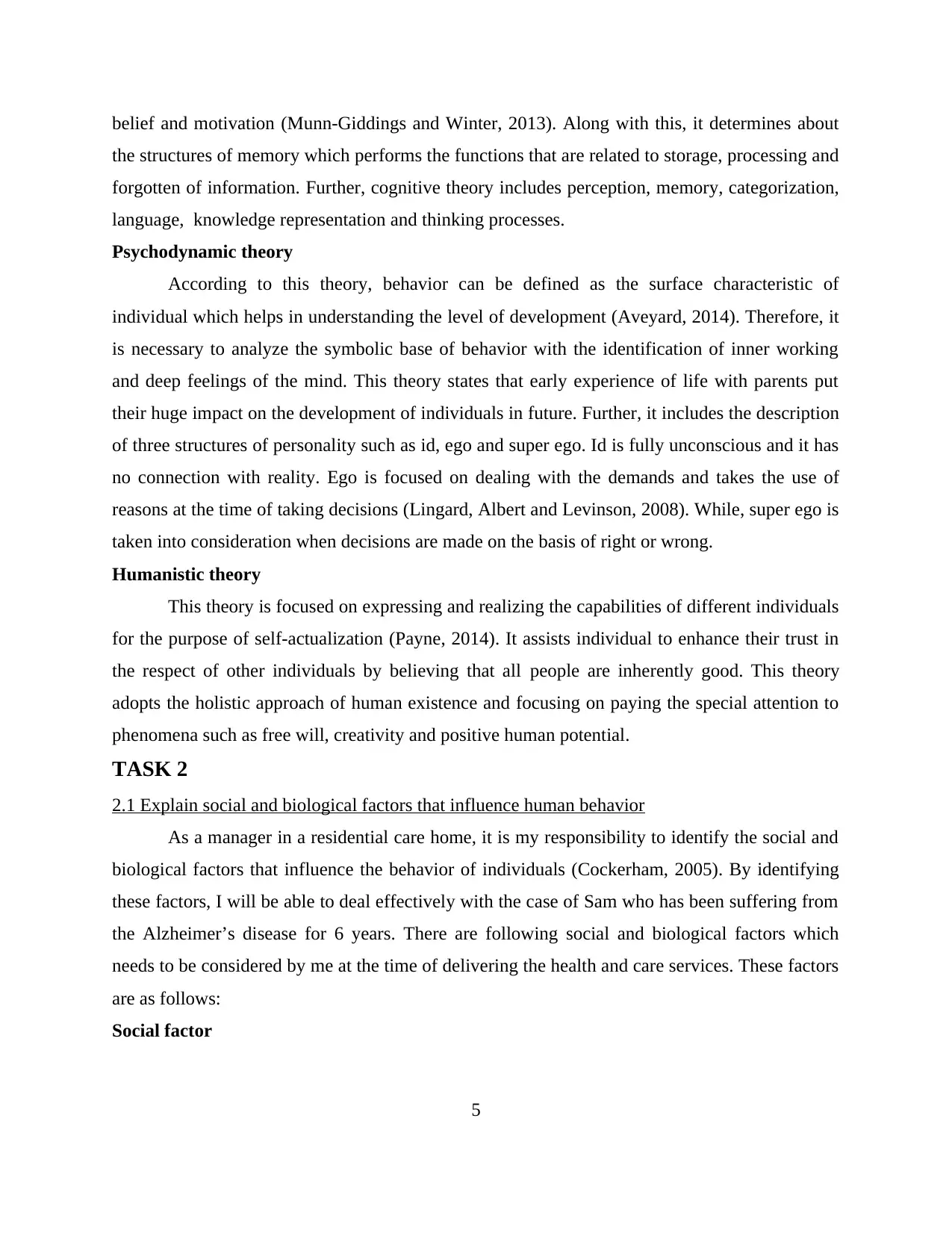
belief and motivation (Munn-Giddings and Winter, 2013). Along with this, it determines about
the structures of memory which performs the functions that are related to storage, processing and
forgotten of information. Further, cognitive theory includes perception, memory, categorization,
language, knowledge representation and thinking processes.
Psychodynamic theory
According to this theory, behavior can be defined as the surface characteristic of
individual which helps in understanding the level of development (Aveyard, 2014). Therefore, it
is necessary to analyze the symbolic base of behavior with the identification of inner working
and deep feelings of the mind. This theory states that early experience of life with parents put
their huge impact on the development of individuals in future. Further, it includes the description
of three structures of personality such as id, ego and super ego. Id is fully unconscious and it has
no connection with reality. Ego is focused on dealing with the demands and takes the use of
reasons at the time of taking decisions (Lingard, Albert and Levinson, 2008). While, super ego is
taken into consideration when decisions are made on the basis of right or wrong.
Humanistic theory
This theory is focused on expressing and realizing the capabilities of different individuals
for the purpose of self-actualization (Payne, 2014). It assists individual to enhance their trust in
the respect of other individuals by believing that all people are inherently good. This theory
adopts the holistic approach of human existence and focusing on paying the special attention to
phenomena such as free will, creativity and positive human potential.
TASK 2
2.1 Explain social and biological factors that influence human behavior
As a manager in a residential care home, it is my responsibility to identify the social and
biological factors that influence the behavior of individuals (Cockerham, 2005). By identifying
these factors, I will be able to deal effectively with the case of Sam who has been suffering from
the Alzheimer’s disease for 6 years. There are following social and biological factors which
needs to be considered by me at the time of delivering the health and care services. These factors
are as follows:
Social factor
5
the structures of memory which performs the functions that are related to storage, processing and
forgotten of information. Further, cognitive theory includes perception, memory, categorization,
language, knowledge representation and thinking processes.
Psychodynamic theory
According to this theory, behavior can be defined as the surface characteristic of
individual which helps in understanding the level of development (Aveyard, 2014). Therefore, it
is necessary to analyze the symbolic base of behavior with the identification of inner working
and deep feelings of the mind. This theory states that early experience of life with parents put
their huge impact on the development of individuals in future. Further, it includes the description
of three structures of personality such as id, ego and super ego. Id is fully unconscious and it has
no connection with reality. Ego is focused on dealing with the demands and takes the use of
reasons at the time of taking decisions (Lingard, Albert and Levinson, 2008). While, super ego is
taken into consideration when decisions are made on the basis of right or wrong.
Humanistic theory
This theory is focused on expressing and realizing the capabilities of different individuals
for the purpose of self-actualization (Payne, 2014). It assists individual to enhance their trust in
the respect of other individuals by believing that all people are inherently good. This theory
adopts the holistic approach of human existence and focusing on paying the special attention to
phenomena such as free will, creativity and positive human potential.
TASK 2
2.1 Explain social and biological factors that influence human behavior
As a manager in a residential care home, it is my responsibility to identify the social and
biological factors that influence the behavior of individuals (Cockerham, 2005). By identifying
these factors, I will be able to deal effectively with the case of Sam who has been suffering from
the Alzheimer’s disease for 6 years. There are following social and biological factors which
needs to be considered by me at the time of delivering the health and care services. These factors
are as follows:
Social factor
5
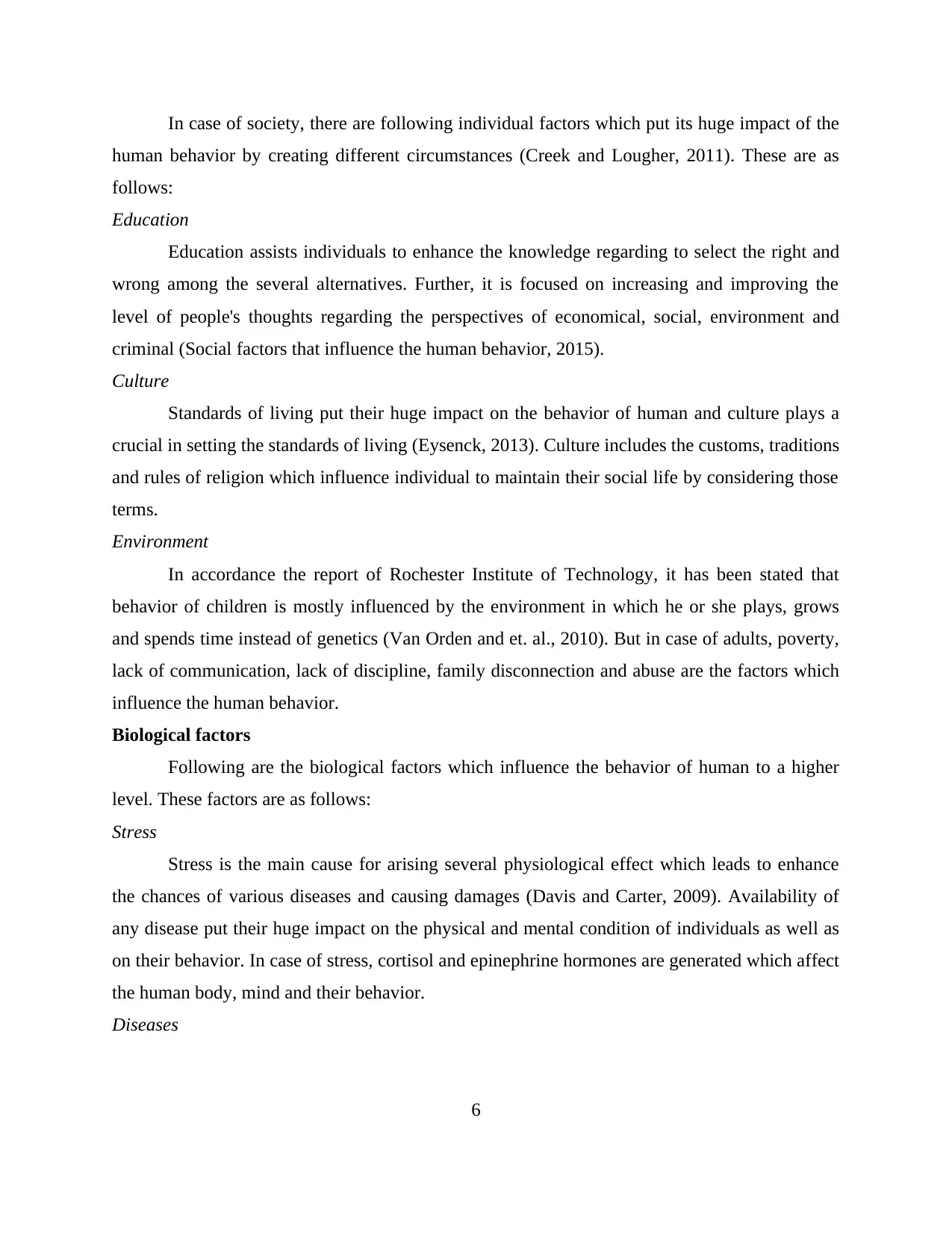
In case of society, there are following individual factors which put its huge impact of the
human behavior by creating different circumstances (Creek and Lougher, 2011). These are as
follows:
Education
Education assists individuals to enhance the knowledge regarding to select the right and
wrong among the several alternatives. Further, it is focused on increasing and improving the
level of people's thoughts regarding the perspectives of economical, social, environment and
criminal (Social factors that influence the human behavior, 2015).
Culture
Standards of living put their huge impact on the behavior of human and culture plays a
crucial in setting the standards of living (Eysenck, 2013). Culture includes the customs, traditions
and rules of religion which influence individual to maintain their social life by considering those
terms.
Environment
In accordance the report of Rochester Institute of Technology, it has been stated that
behavior of children is mostly influenced by the environment in which he or she plays, grows
and spends time instead of genetics (Van Orden and et. al., 2010). But in case of adults, poverty,
lack of communication, lack of discipline, family disconnection and abuse are the factors which
influence the human behavior.
Biological factors
Following are the biological factors which influence the behavior of human to a higher
level. These factors are as follows:
Stress
Stress is the main cause for arising several physiological effect which leads to enhance
the chances of various diseases and causing damages (Davis and Carter, 2009). Availability of
any disease put their huge impact on the physical and mental condition of individuals as well as
on their behavior. In case of stress, cortisol and epinephrine hormones are generated which affect
the human body, mind and their behavior.
Diseases
6
human behavior by creating different circumstances (Creek and Lougher, 2011). These are as
follows:
Education
Education assists individuals to enhance the knowledge regarding to select the right and
wrong among the several alternatives. Further, it is focused on increasing and improving the
level of people's thoughts regarding the perspectives of economical, social, environment and
criminal (Social factors that influence the human behavior, 2015).
Culture
Standards of living put their huge impact on the behavior of human and culture plays a
crucial in setting the standards of living (Eysenck, 2013). Culture includes the customs, traditions
and rules of religion which influence individual to maintain their social life by considering those
terms.
Environment
In accordance the report of Rochester Institute of Technology, it has been stated that
behavior of children is mostly influenced by the environment in which he or she plays, grows
and spends time instead of genetics (Van Orden and et. al., 2010). But in case of adults, poverty,
lack of communication, lack of discipline, family disconnection and abuse are the factors which
influence the human behavior.
Biological factors
Following are the biological factors which influence the behavior of human to a higher
level. These factors are as follows:
Stress
Stress is the main cause for arising several physiological effect which leads to enhance
the chances of various diseases and causing damages (Davis and Carter, 2009). Availability of
any disease put their huge impact on the physical and mental condition of individuals as well as
on their behavior. In case of stress, cortisol and epinephrine hormones are generated which affect
the human body, mind and their behavior.
Diseases
6
⊘ This is a preview!⊘
Do you want full access?
Subscribe today to unlock all pages.

Trusted by 1+ million students worldwide
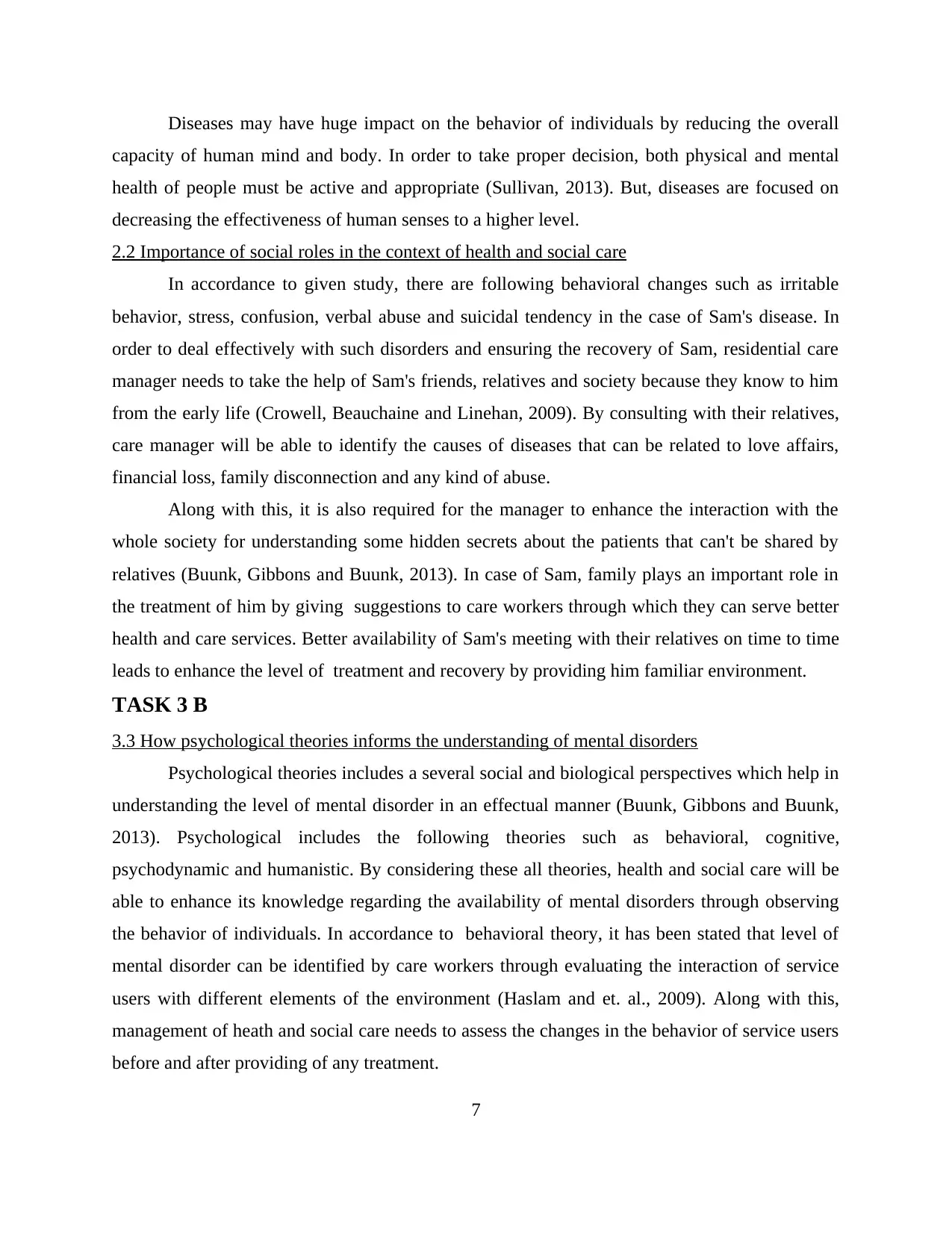
Diseases may have huge impact on the behavior of individuals by reducing the overall
capacity of human mind and body. In order to take proper decision, both physical and mental
health of people must be active and appropriate (Sullivan, 2013). But, diseases are focused on
decreasing the effectiveness of human senses to a higher level.
2.2 Importance of social roles in the context of health and social care
In accordance to given study, there are following behavioral changes such as irritable
behavior, stress, confusion, verbal abuse and suicidal tendency in the case of Sam's disease. In
order to deal effectively with such disorders and ensuring the recovery of Sam, residential care
manager needs to take the help of Sam's friends, relatives and society because they know to him
from the early life (Crowell, Beauchaine and Linehan, 2009). By consulting with their relatives,
care manager will be able to identify the causes of diseases that can be related to love affairs,
financial loss, family disconnection and any kind of abuse.
Along with this, it is also required for the manager to enhance the interaction with the
whole society for understanding some hidden secrets about the patients that can't be shared by
relatives (Buunk, Gibbons and Buunk, 2013). In case of Sam, family plays an important role in
the treatment of him by giving suggestions to care workers through which they can serve better
health and care services. Better availability of Sam's meeting with their relatives on time to time
leads to enhance the level of treatment and recovery by providing him familiar environment.
TASK 3 B
3.3 How psychological theories informs the understanding of mental disorders
Psychological theories includes a several social and biological perspectives which help in
understanding the level of mental disorder in an effectual manner (Buunk, Gibbons and Buunk,
2013). Psychological includes the following theories such as behavioral, cognitive,
psychodynamic and humanistic. By considering these all theories, health and social care will be
able to enhance its knowledge regarding the availability of mental disorders through observing
the behavior of individuals. In accordance to behavioral theory, it has been stated that level of
mental disorder can be identified by care workers through evaluating the interaction of service
users with different elements of the environment (Haslam and et. al., 2009). Along with this,
management of heath and social care needs to assess the changes in the behavior of service users
before and after providing of any treatment.
7
capacity of human mind and body. In order to take proper decision, both physical and mental
health of people must be active and appropriate (Sullivan, 2013). But, diseases are focused on
decreasing the effectiveness of human senses to a higher level.
2.2 Importance of social roles in the context of health and social care
In accordance to given study, there are following behavioral changes such as irritable
behavior, stress, confusion, verbal abuse and suicidal tendency in the case of Sam's disease. In
order to deal effectively with such disorders and ensuring the recovery of Sam, residential care
manager needs to take the help of Sam's friends, relatives and society because they know to him
from the early life (Crowell, Beauchaine and Linehan, 2009). By consulting with their relatives,
care manager will be able to identify the causes of diseases that can be related to love affairs,
financial loss, family disconnection and any kind of abuse.
Along with this, it is also required for the manager to enhance the interaction with the
whole society for understanding some hidden secrets about the patients that can't be shared by
relatives (Buunk, Gibbons and Buunk, 2013). In case of Sam, family plays an important role in
the treatment of him by giving suggestions to care workers through which they can serve better
health and care services. Better availability of Sam's meeting with their relatives on time to time
leads to enhance the level of treatment and recovery by providing him familiar environment.
TASK 3 B
3.3 How psychological theories informs the understanding of mental disorders
Psychological theories includes a several social and biological perspectives which help in
understanding the level of mental disorder in an effectual manner (Buunk, Gibbons and Buunk,
2013). Psychological includes the following theories such as behavioral, cognitive,
psychodynamic and humanistic. By considering these all theories, health and social care will be
able to enhance its knowledge regarding the availability of mental disorders through observing
the behavior of individuals. In accordance to behavioral theory, it has been stated that level of
mental disorder can be identified by care workers through evaluating the interaction of service
users with different elements of the environment (Haslam and et. al., 2009). Along with this,
management of heath and social care needs to assess the changes in the behavior of service users
before and after providing of any treatment.
7
Paraphrase This Document
Need a fresh take? Get an instant paraphrase of this document with our AI Paraphraser
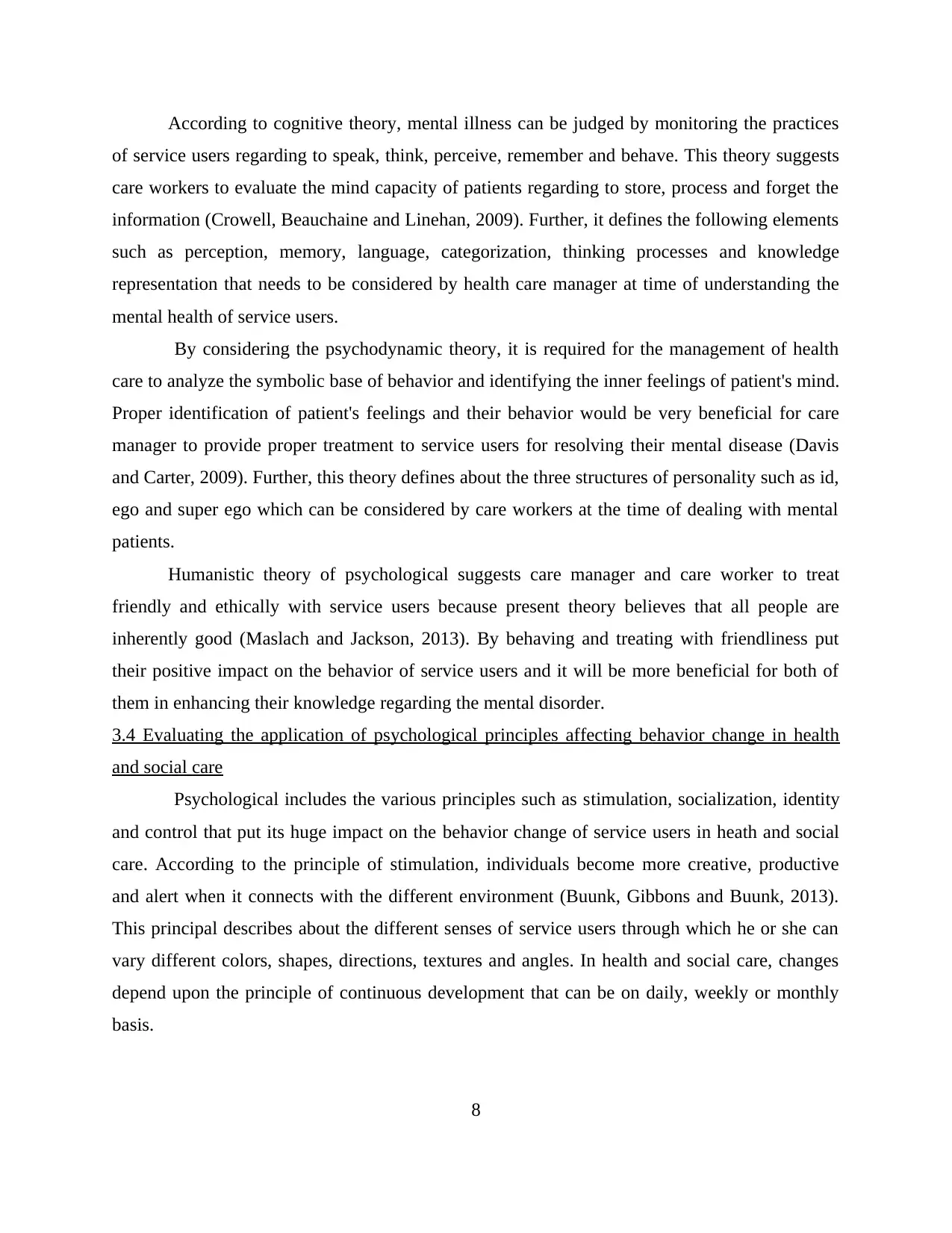
According to cognitive theory, mental illness can be judged by monitoring the practices
of service users regarding to speak, think, perceive, remember and behave. This theory suggests
care workers to evaluate the mind capacity of patients regarding to store, process and forget the
information (Crowell, Beauchaine and Linehan, 2009). Further, it defines the following elements
such as perception, memory, language, categorization, thinking processes and knowledge
representation that needs to be considered by health care manager at time of understanding the
mental health of service users.
By considering the psychodynamic theory, it is required for the management of health
care to analyze the symbolic base of behavior and identifying the inner feelings of patient's mind.
Proper identification of patient's feelings and their behavior would be very beneficial for care
manager to provide proper treatment to service users for resolving their mental disease (Davis
and Carter, 2009). Further, this theory defines about the three structures of personality such as id,
ego and super ego which can be considered by care workers at the time of dealing with mental
patients.
Humanistic theory of psychological suggests care manager and care worker to treat
friendly and ethically with service users because present theory believes that all people are
inherently good (Maslach and Jackson, 2013). By behaving and treating with friendliness put
their positive impact on the behavior of service users and it will be more beneficial for both of
them in enhancing their knowledge regarding the mental disorder.
3.4 Evaluating the application of psychological principles affecting behavior change in health
and social care
Psychological includes the various principles such as stimulation, socialization, identity
and control that put its huge impact on the behavior change of service users in heath and social
care. According to the principle of stimulation, individuals become more creative, productive
and alert when it connects with the different environment (Buunk, Gibbons and Buunk, 2013).
This principal describes about the different senses of service users through which he or she can
vary different colors, shapes, directions, textures and angles. In health and social care, changes
depend upon the principle of continuous development that can be on daily, weekly or monthly
basis.
8
of service users regarding to speak, think, perceive, remember and behave. This theory suggests
care workers to evaluate the mind capacity of patients regarding to store, process and forget the
information (Crowell, Beauchaine and Linehan, 2009). Further, it defines the following elements
such as perception, memory, language, categorization, thinking processes and knowledge
representation that needs to be considered by health care manager at time of understanding the
mental health of service users.
By considering the psychodynamic theory, it is required for the management of health
care to analyze the symbolic base of behavior and identifying the inner feelings of patient's mind.
Proper identification of patient's feelings and their behavior would be very beneficial for care
manager to provide proper treatment to service users for resolving their mental disease (Davis
and Carter, 2009). Further, this theory defines about the three structures of personality such as id,
ego and super ego which can be considered by care workers at the time of dealing with mental
patients.
Humanistic theory of psychological suggests care manager and care worker to treat
friendly and ethically with service users because present theory believes that all people are
inherently good (Maslach and Jackson, 2013). By behaving and treating with friendliness put
their positive impact on the behavior of service users and it will be more beneficial for both of
them in enhancing their knowledge regarding the mental disorder.
3.4 Evaluating the application of psychological principles affecting behavior change in health
and social care
Psychological includes the various principles such as stimulation, socialization, identity
and control that put its huge impact on the behavior change of service users in heath and social
care. According to the principle of stimulation, individuals become more creative, productive
and alert when it connects with the different environment (Buunk, Gibbons and Buunk, 2013).
This principal describes about the different senses of service users through which he or she can
vary different colors, shapes, directions, textures and angles. In health and social care, changes
depend upon the principle of continuous development that can be on daily, weekly or monthly
basis.
8
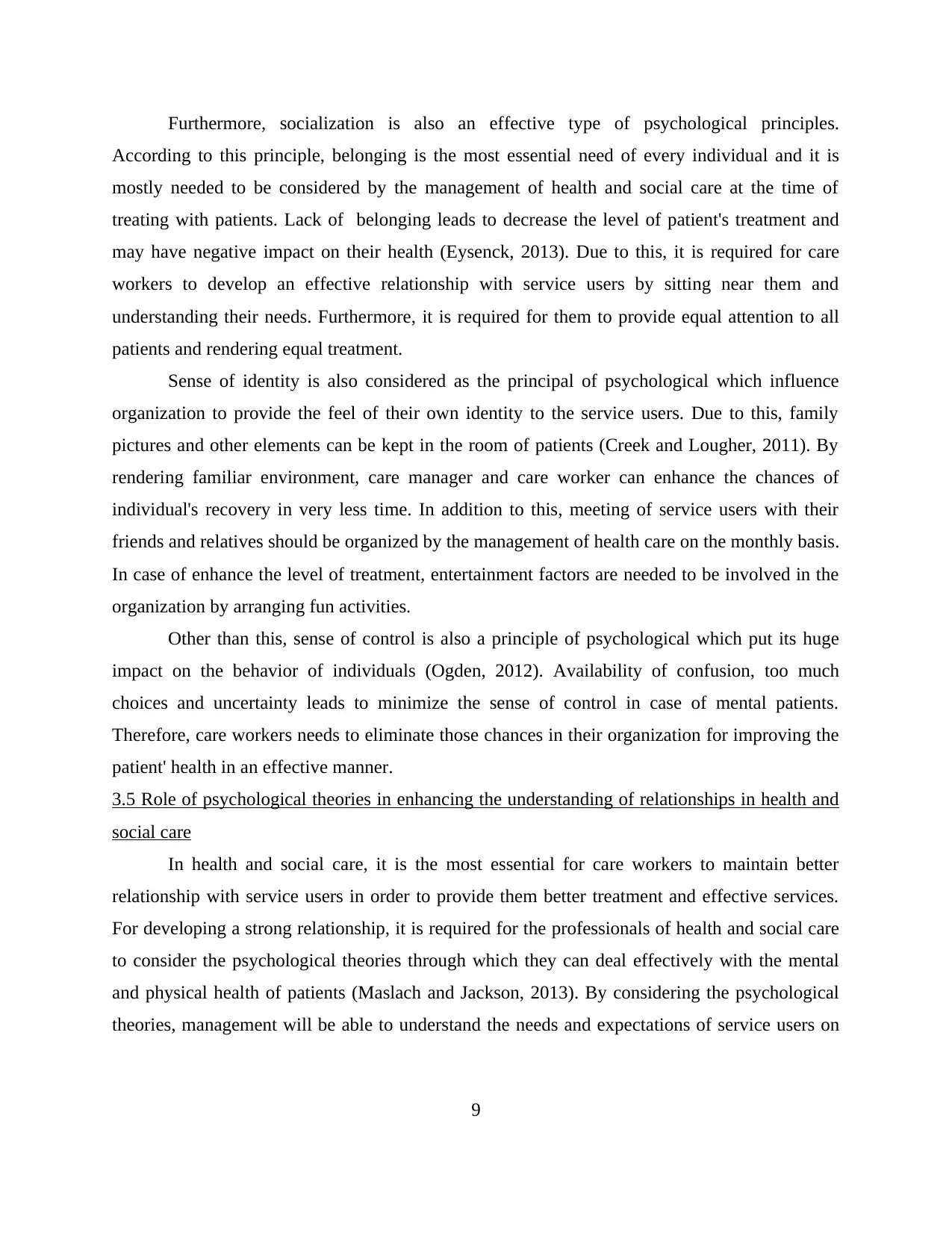
Furthermore, socialization is also an effective type of psychological principles.
According to this principle, belonging is the most essential need of every individual and it is
mostly needed to be considered by the management of health and social care at the time of
treating with patients. Lack of belonging leads to decrease the level of patient's treatment and
may have negative impact on their health (Eysenck, 2013). Due to this, it is required for care
workers to develop an effective relationship with service users by sitting near them and
understanding their needs. Furthermore, it is required for them to provide equal attention to all
patients and rendering equal treatment.
Sense of identity is also considered as the principal of psychological which influence
organization to provide the feel of their own identity to the service users. Due to this, family
pictures and other elements can be kept in the room of patients (Creek and Lougher, 2011). By
rendering familiar environment, care manager and care worker can enhance the chances of
individual's recovery in very less time. In addition to this, meeting of service users with their
friends and relatives should be organized by the management of health care on the monthly basis.
In case of enhance the level of treatment, entertainment factors are needed to be involved in the
organization by arranging fun activities.
Other than this, sense of control is also a principle of psychological which put its huge
impact on the behavior of individuals (Ogden, 2012). Availability of confusion, too much
choices and uncertainty leads to minimize the sense of control in case of mental patients.
Therefore, care workers needs to eliminate those chances in their organization for improving the
patient' health in an effective manner.
3.5 Role of psychological theories in enhancing the understanding of relationships in health and
social care
In health and social care, it is the most essential for care workers to maintain better
relationship with service users in order to provide them better treatment and effective services.
For developing a strong relationship, it is required for the professionals of health and social care
to consider the psychological theories through which they can deal effectively with the mental
and physical health of patients (Maslach and Jackson, 2013). By considering the psychological
theories, management will be able to understand the needs and expectations of service users on
9
According to this principle, belonging is the most essential need of every individual and it is
mostly needed to be considered by the management of health and social care at the time of
treating with patients. Lack of belonging leads to decrease the level of patient's treatment and
may have negative impact on their health (Eysenck, 2013). Due to this, it is required for care
workers to develop an effective relationship with service users by sitting near them and
understanding their needs. Furthermore, it is required for them to provide equal attention to all
patients and rendering equal treatment.
Sense of identity is also considered as the principal of psychological which influence
organization to provide the feel of their own identity to the service users. Due to this, family
pictures and other elements can be kept in the room of patients (Creek and Lougher, 2011). By
rendering familiar environment, care manager and care worker can enhance the chances of
individual's recovery in very less time. In addition to this, meeting of service users with their
friends and relatives should be organized by the management of health care on the monthly basis.
In case of enhance the level of treatment, entertainment factors are needed to be involved in the
organization by arranging fun activities.
Other than this, sense of control is also a principle of psychological which put its huge
impact on the behavior of individuals (Ogden, 2012). Availability of confusion, too much
choices and uncertainty leads to minimize the sense of control in case of mental patients.
Therefore, care workers needs to eliminate those chances in their organization for improving the
patient' health in an effective manner.
3.5 Role of psychological theories in enhancing the understanding of relationships in health and
social care
In health and social care, it is the most essential for care workers to maintain better
relationship with service users in order to provide them better treatment and effective services.
For developing a strong relationship, it is required for the professionals of health and social care
to consider the psychological theories through which they can deal effectively with the mental
and physical health of patients (Maslach and Jackson, 2013). By considering the psychological
theories, management will be able to understand the needs and expectations of service users on
9
⊘ This is a preview!⊘
Do you want full access?
Subscribe today to unlock all pages.

Trusted by 1+ million students worldwide
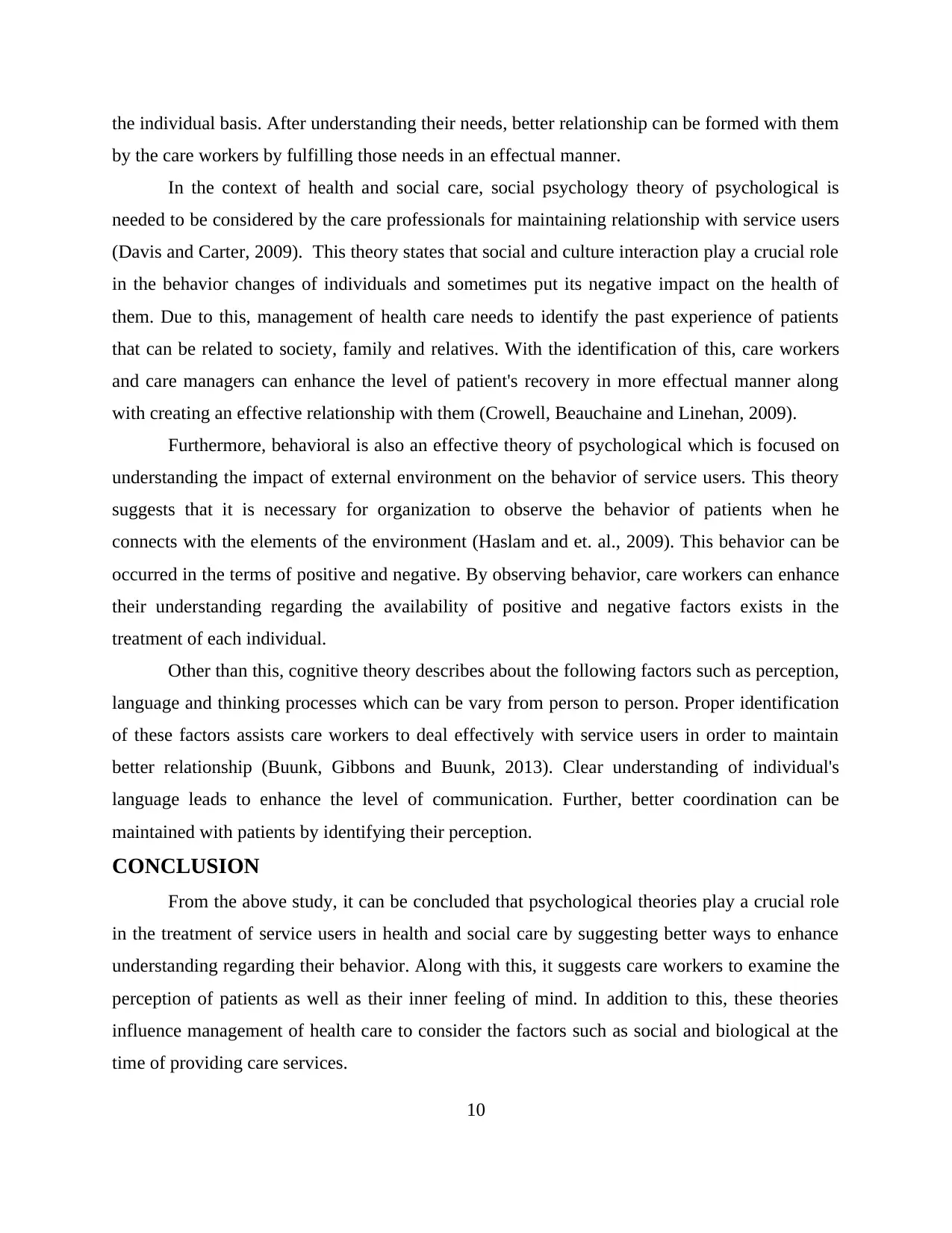
the individual basis. After understanding their needs, better relationship can be formed with them
by the care workers by fulfilling those needs in an effectual manner.
In the context of health and social care, social psychology theory of psychological is
needed to be considered by the care professionals for maintaining relationship with service users
(Davis and Carter, 2009). This theory states that social and culture interaction play a crucial role
in the behavior changes of individuals and sometimes put its negative impact on the health of
them. Due to this, management of health care needs to identify the past experience of patients
that can be related to society, family and relatives. With the identification of this, care workers
and care managers can enhance the level of patient's recovery in more effectual manner along
with creating an effective relationship with them (Crowell, Beauchaine and Linehan, 2009).
Furthermore, behavioral is also an effective theory of psychological which is focused on
understanding the impact of external environment on the behavior of service users. This theory
suggests that it is necessary for organization to observe the behavior of patients when he
connects with the elements of the environment (Haslam and et. al., 2009). This behavior can be
occurred in the terms of positive and negative. By observing behavior, care workers can enhance
their understanding regarding the availability of positive and negative factors exists in the
treatment of each individual.
Other than this, cognitive theory describes about the following factors such as perception,
language and thinking processes which can be vary from person to person. Proper identification
of these factors assists care workers to deal effectively with service users in order to maintain
better relationship (Buunk, Gibbons and Buunk, 2013). Clear understanding of individual's
language leads to enhance the level of communication. Further, better coordination can be
maintained with patients by identifying their perception.
CONCLUSION
From the above study, it can be concluded that psychological theories play a crucial role
in the treatment of service users in health and social care by suggesting better ways to enhance
understanding regarding their behavior. Along with this, it suggests care workers to examine the
perception of patients as well as their inner feeling of mind. In addition to this, these theories
influence management of health care to consider the factors such as social and biological at the
time of providing care services.
10
by the care workers by fulfilling those needs in an effectual manner.
In the context of health and social care, social psychology theory of psychological is
needed to be considered by the care professionals for maintaining relationship with service users
(Davis and Carter, 2009). This theory states that social and culture interaction play a crucial role
in the behavior changes of individuals and sometimes put its negative impact on the health of
them. Due to this, management of health care needs to identify the past experience of patients
that can be related to society, family and relatives. With the identification of this, care workers
and care managers can enhance the level of patient's recovery in more effectual manner along
with creating an effective relationship with them (Crowell, Beauchaine and Linehan, 2009).
Furthermore, behavioral is also an effective theory of psychological which is focused on
understanding the impact of external environment on the behavior of service users. This theory
suggests that it is necessary for organization to observe the behavior of patients when he
connects with the elements of the environment (Haslam and et. al., 2009). This behavior can be
occurred in the terms of positive and negative. By observing behavior, care workers can enhance
their understanding regarding the availability of positive and negative factors exists in the
treatment of each individual.
Other than this, cognitive theory describes about the following factors such as perception,
language and thinking processes which can be vary from person to person. Proper identification
of these factors assists care workers to deal effectively with service users in order to maintain
better relationship (Buunk, Gibbons and Buunk, 2013). Clear understanding of individual's
language leads to enhance the level of communication. Further, better coordination can be
maintained with patients by identifying their perception.
CONCLUSION
From the above study, it can be concluded that psychological theories play a crucial role
in the treatment of service users in health and social care by suggesting better ways to enhance
understanding regarding their behavior. Along with this, it suggests care workers to examine the
perception of patients as well as their inner feeling of mind. In addition to this, these theories
influence management of health care to consider the factors such as social and biological at the
time of providing care services.
10
Paraphrase This Document
Need a fresh take? Get an instant paraphrase of this document with our AI Paraphraser
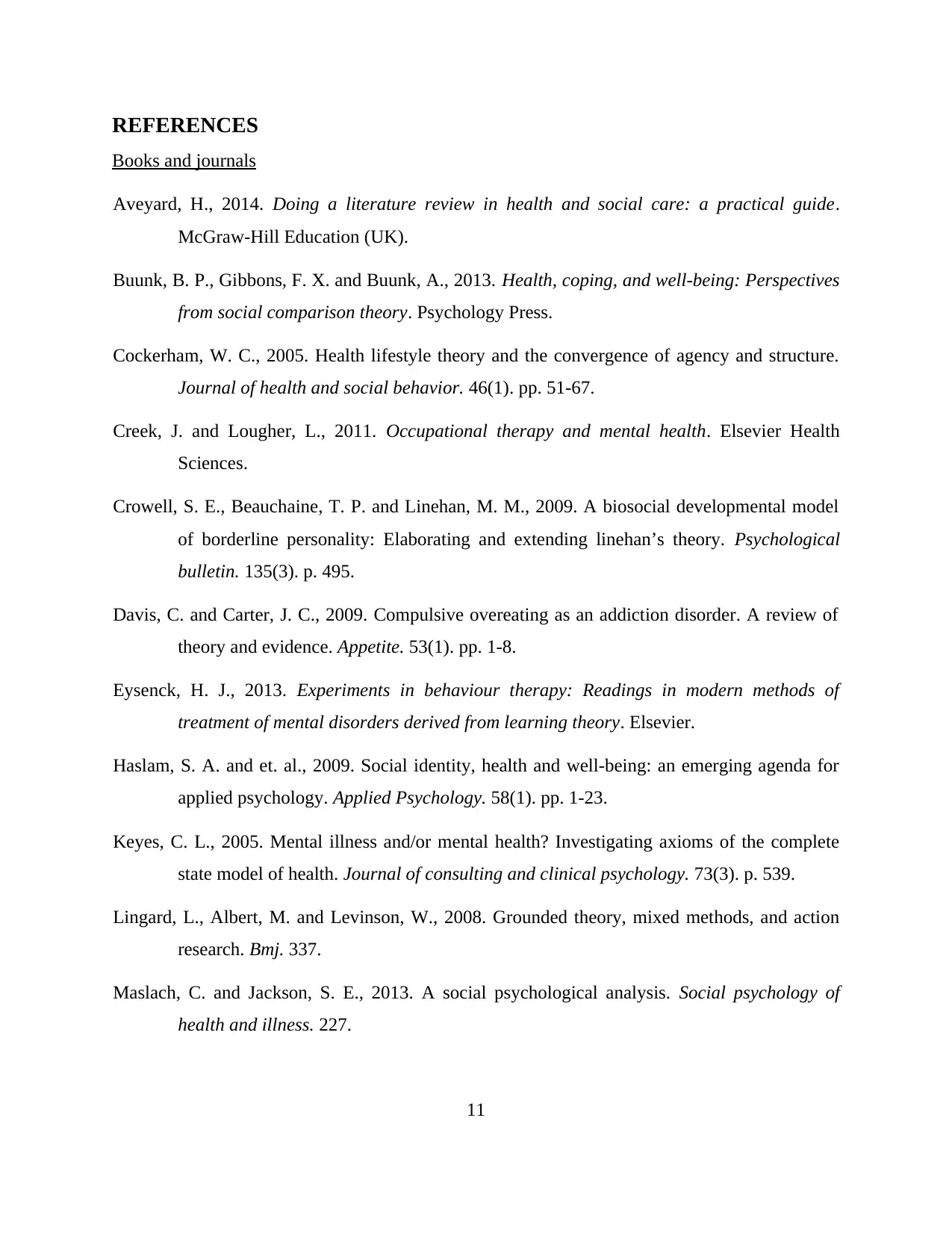
REFERENCES
Books and journals
Aveyard, H., 2014. Doing a literature review in health and social care: a practical guide.
McGraw-Hill Education (UK).
Buunk, B. P., Gibbons, F. X. and Buunk, A., 2013. Health, coping, and well-being: Perspectives
from social comparison theory. Psychology Press.
Cockerham, W. C., 2005. Health lifestyle theory and the convergence of agency and structure.
Journal of health and social behavior. 46(1). pp. 51-67.
Creek, J. and Lougher, L., 2011. Occupational therapy and mental health. Elsevier Health
Sciences.
Crowell, S. E., Beauchaine, T. P. and Linehan, M. M., 2009. A biosocial developmental model
of borderline personality: Elaborating and extending linehan’s theory. Psychological
bulletin. 135(3). p. 495.
Davis, C. and Carter, J. C., 2009. Compulsive overeating as an addiction disorder. A review of
theory and evidence. Appetite. 53(1). pp. 1-8.
Eysenck, H. J., 2013. Experiments in behaviour therapy: Readings in modern methods of
treatment of mental disorders derived from learning theory. Elsevier.
Haslam, S. A. and et. al., 2009. Social identity, health and well‐being: an emerging agenda for
applied psychology. Applied Psychology. 58(1). pp. 1-23.
Keyes, C. L., 2005. Mental illness and/or mental health? Investigating axioms of the complete
state model of health. Journal of consulting and clinical psychology. 73(3). p. 539.
Lingard, L., Albert, M. and Levinson, W., 2008. Grounded theory, mixed methods, and action
research. Bmj. 337.
Maslach, C. and Jackson, S. E., 2013. A social psychological analysis. Social psychology of
health and illness. 227.
11
Books and journals
Aveyard, H., 2014. Doing a literature review in health and social care: a practical guide.
McGraw-Hill Education (UK).
Buunk, B. P., Gibbons, F. X. and Buunk, A., 2013. Health, coping, and well-being: Perspectives
from social comparison theory. Psychology Press.
Cockerham, W. C., 2005. Health lifestyle theory and the convergence of agency and structure.
Journal of health and social behavior. 46(1). pp. 51-67.
Creek, J. and Lougher, L., 2011. Occupational therapy and mental health. Elsevier Health
Sciences.
Crowell, S. E., Beauchaine, T. P. and Linehan, M. M., 2009. A biosocial developmental model
of borderline personality: Elaborating and extending linehan’s theory. Psychological
bulletin. 135(3). p. 495.
Davis, C. and Carter, J. C., 2009. Compulsive overeating as an addiction disorder. A review of
theory and evidence. Appetite. 53(1). pp. 1-8.
Eysenck, H. J., 2013. Experiments in behaviour therapy: Readings in modern methods of
treatment of mental disorders derived from learning theory. Elsevier.
Haslam, S. A. and et. al., 2009. Social identity, health and well‐being: an emerging agenda for
applied psychology. Applied Psychology. 58(1). pp. 1-23.
Keyes, C. L., 2005. Mental illness and/or mental health? Investigating axioms of the complete
state model of health. Journal of consulting and clinical psychology. 73(3). p. 539.
Lingard, L., Albert, M. and Levinson, W., 2008. Grounded theory, mixed methods, and action
research. Bmj. 337.
Maslach, C. and Jackson, S. E., 2013. A social psychological analysis. Social psychology of
health and illness. 227.
11
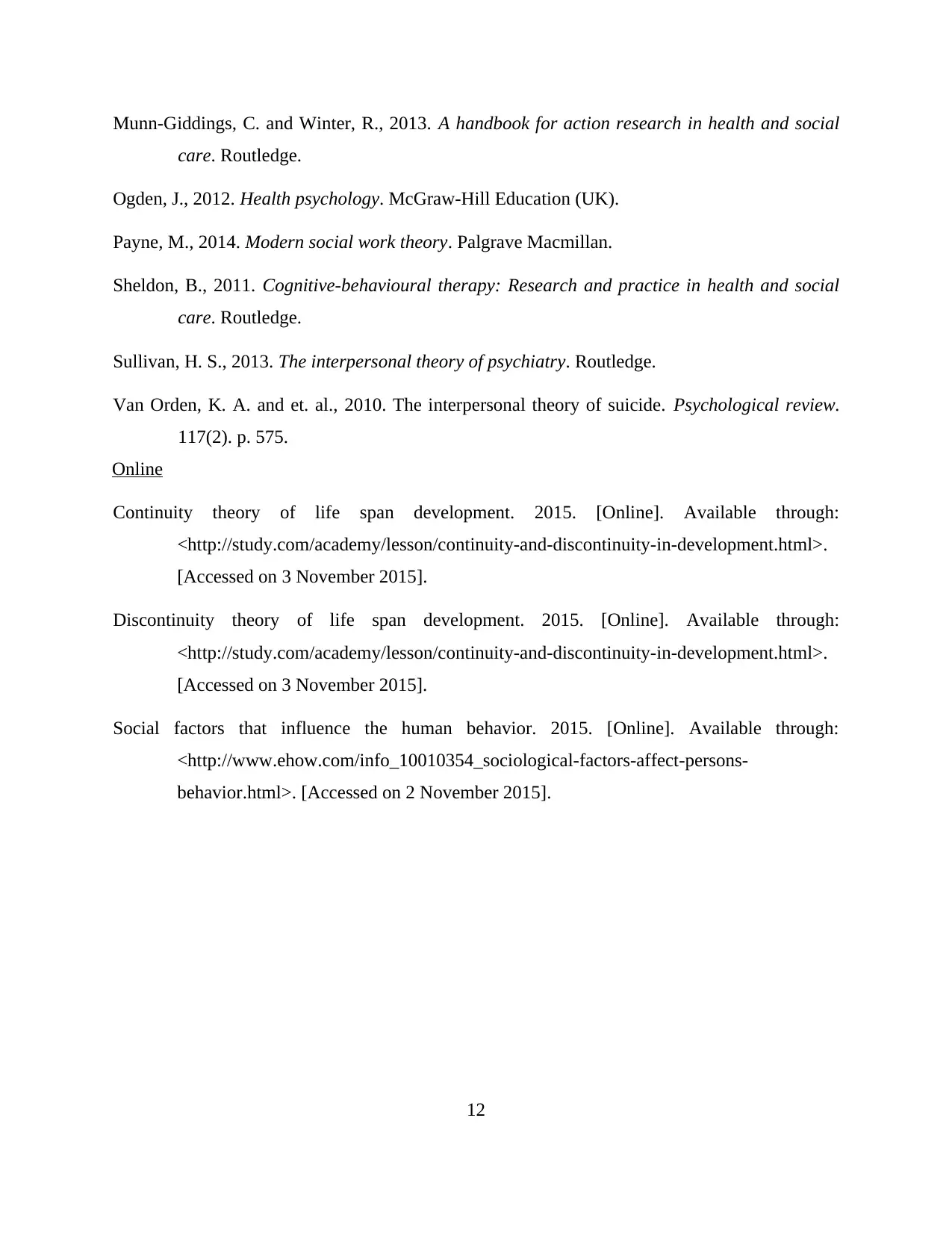
Munn-Giddings, C. and Winter, R., 2013. A handbook for action research in health and social
care. Routledge.
Ogden, J., 2012. Health psychology. McGraw-Hill Education (UK).
Payne, M., 2014. Modern social work theory. Palgrave Macmillan.
Sheldon, B., 2011. Cognitive-behavioural therapy: Research and practice in health and social
care. Routledge.
Sullivan, H. S., 2013. The interpersonal theory of psychiatry. Routledge.
Van Orden, K. A. and et. al., 2010. The interpersonal theory of suicide. Psychological review.
117(2). p. 575.
Online
Continuity theory of life span development. 2015. [Online]. Available through:
<http://study.com/academy/lesson/continuity-and-discontinuity-in-development.html>.
[Accessed on 3 November 2015].
Discontinuity theory of life span development. 2015. [Online]. Available through:
<http://study.com/academy/lesson/continuity-and-discontinuity-in-development.html>.
[Accessed on 3 November 2015].
Social factors that influence the human behavior. 2015. [Online]. Available through:
<http://www.ehow.com/info_10010354_sociological-factors-affect-persons-
behavior.html>. [Accessed on 2 November 2015].
12
care. Routledge.
Ogden, J., 2012. Health psychology. McGraw-Hill Education (UK).
Payne, M., 2014. Modern social work theory. Palgrave Macmillan.
Sheldon, B., 2011. Cognitive-behavioural therapy: Research and practice in health and social
care. Routledge.
Sullivan, H. S., 2013. The interpersonal theory of psychiatry. Routledge.
Van Orden, K. A. and et. al., 2010. The interpersonal theory of suicide. Psychological review.
117(2). p. 575.
Online
Continuity theory of life span development. 2015. [Online]. Available through:
<http://study.com/academy/lesson/continuity-and-discontinuity-in-development.html>.
[Accessed on 3 November 2015].
Discontinuity theory of life span development. 2015. [Online]. Available through:
<http://study.com/academy/lesson/continuity-and-discontinuity-in-development.html>.
[Accessed on 3 November 2015].
Social factors that influence the human behavior. 2015. [Online]. Available through:
<http://www.ehow.com/info_10010354_sociological-factors-affect-persons-
behavior.html>. [Accessed on 2 November 2015].
12
⊘ This is a preview!⊘
Do you want full access?
Subscribe today to unlock all pages.

Trusted by 1+ million students worldwide
1 out of 12
Related Documents
Your All-in-One AI-Powered Toolkit for Academic Success.
+13062052269
info@desklib.com
Available 24*7 on WhatsApp / Email
![[object Object]](/_next/static/media/star-bottom.7253800d.svg)
Unlock your academic potential
Copyright © 2020–2025 A2Z Services. All Rights Reserved. Developed and managed by ZUCOL.





